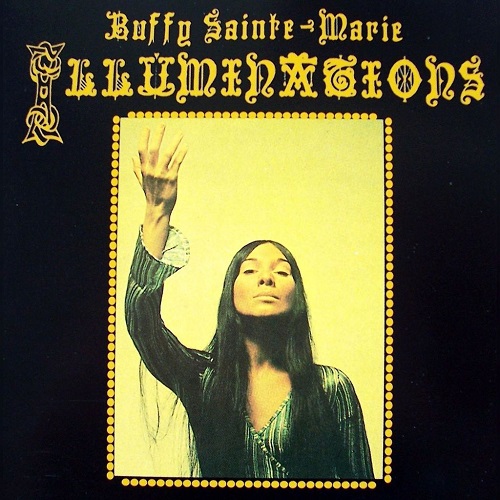Photos courtesy of Eric Alper
“Illuminations by Buffy Sainte-Marie is one of my favorite albums. When she sings at her best, it’s the soul laid bare.” – Steve Hackett (2020)
“I think that I dared to be original because I knew I couldn’t get in. I knew I wouldn’t be allowed in the pool with the cool kids, so I might as well do what I think is fun.” – Buffy Sainte-Marie (2020)
*
Hailed as a pioneer and troubadour of the 1960s folk movement, Buffy Sainte-Marie set about taking her music and voice to extreme — yet entirely individual — heights by the end of that decade.
In 1969, she released her sixth album Illuminations, a work rife with social consciousness, religious imagery, and sweet balladry, all underscored by electronic and synthesized musical manipulations that showcased her unabashed fearlessness in not wanting to be pigeonholed to any musical genre. With the album recently turning 50, I sought to get inside Buffy’s head and learn more about where the album’s collective diversity came from.
“I wanted something to get beyond the same old four-chord currently trending whatevers everybody else was doing. Musically it was pretty damn vanilla out there,” she told me recently. “Although there were master musicians in every genre from bluegrass to pop, when it came to experimentation the sky was wide open and there were no rules. ARPs, matrix switchboards and other new [and] unusual instruments are like catnip to musicians like me. Although Illuminations is experiment-central, other experimental elements show up every now and then throughout my film scores and discography. I just get happy with sound.”
Buffy also pointed out that while Illuminations “is homogeneous unto itself,” it actually reflects prior work of hers which were either multi-genre or no-genre at all. While most will likely know Buffy best for her Oscar-winning composition “Up Where We Belong,” her single “Universal Soldier,” or her frequent appearances on Sesame Street, as a musician, her legacy lies in being a true musical chameleon, blending sounds and color with full ease all to infectious kaleidoscopic results.
“Although the 1960s started out being about the Kingston Trio preppy bands, Pete Seeger and Woody Guthrie, my albums weren’t like that,” she said. “For me, hopefully a collection of songs creates a synergy the way a novel does — bigger than the sum of its parts — with different characters, different locations, different emotions, and atmospheres. I was just trying to make a record that sounded like how I was hearing each song in my head. As usual, I had a bunch of songs, each of them a snapshot of something real in my life, like a little movie, and each song was unique.”
Utilizing a Buchla synthesizer and enlisting the help of electronic music pioneer Michael Czajkowski, Buffy’s altered voice shines through immediately in the opening track “God is Alive, Magic is Afoot.” On a first listen, you might think the CD — or vinyl — is intentionally skipping.
 “I think (Michael) was able to fulfill for listeners what I was trying to tell him in words. I wanted more. I couldn’t talk to Vanguard Records the way I could talk to Michael. Michael took my voice and guitar and helped me to be more of where I was trying to go myself with it,” Buffy told me. “We had a common language. It wasn’t like talking to a drummer or guitar player. I wanted each song to be itself and to be stretched and processed into a more visual version of what I was able to accomplish just with a guitar and a vocal.”
“I think (Michael) was able to fulfill for listeners what I was trying to tell him in words. I wanted more. I couldn’t talk to Vanguard Records the way I could talk to Michael. Michael took my voice and guitar and helped me to be more of where I was trying to go myself with it,” Buffy told me. “We had a common language. It wasn’t like talking to a drummer or guitar player. I wanted each song to be itself and to be stretched and processed into a more visual version of what I was able to accomplish just with a guitar and a vocal.”
“God Is Alive” stems from text in legend Leonard Cohen’s book Beautiful Losers. In a breathless intensifying stream of consciousness, Buffy helps Cohen’s text come alive as cosmic imagery takes shape and begins spilling into the entire album. Buffy also gives spiritual, cinema verité treatment to the song “Adam,” penned by folk legend Richie Havens.
Alternately sweet sounding on one track thanks to her lush, sonorous vibrato, and brash and uncompromising the next, Buffy shifts through moods and tones frequently throughout the 35-minute Illuminations. “Mary” is wonderfully ragged as she sings about the birth of Jesus from Mary’s perspective. “Better to Find Out Yourself” is intense, brooding and rivals anything Tim Buckley released within the same era. “The Vampire” seemingly takes a page out of the Doors playbook. “Guess Who I Saw In Paris” is sweet and sentimental, based, according to Buffy, on real-life experience.
A near-heavenly tune called “The Angel” was described to me recently by former Genesis guitarist Steve Hackett as being “so heartfelt with that pleading quality her voice has, practically sobbing. It’s the most emotional female voice I’ve ever heard.”
I don’t want to pick out standout tracks on the album given that they encompass a tremendous whole. In Buffy’s words, Illuminations is like “an album of title songs for a book of short stories.” Yet one of the album’s definitive offerings is “Suffer The Little Children,” which is all at once discordant and catchy. You can hear the protest in every strummed and sung note. Here, Buffy reflects on her pre-singer period as a teacher, seeing firsthand how parents would regard her students. Morrissey would add his own spin to the track decades later.
“Musically it’s doing things that musicians don’t do very often, at least not on records. It goes out of rhythm. The ordinary voice band – piano, bass, guitar, drums is not going to come up with something like that. It’s more Brian Eno or Billie Eilish territory,” she told me, adding for context: “Parents would be talking about their kids’ futures as if they were investing pork bellies in the stock market. To think some of these kids are going to go on to a future where their parents don’t really give a shit, that’s what the song’s about really. It’s about parents using children as a source of pride.”
Buffy adds that she sees a lot of her style and music sense in Eilish, who recently took home several Grammys including album of the year for her debut studio album When We All Fall Asleep, Where Do We Go?
“It’s very special in the way Illuminations is special. It’s so original,” she says.
The album’s closer “Poppies” invokes Buffy at her most ethereal and dreamlike. Bringing back synthesizer manipulation, Buffy sounds spirit-like, cascading over listeners with a haunting vocal. In some ways, this song can be considered a precursor to future singer-songwriter tracks like Carly Simon’s “That’s the Way I’ve Always Heard It Should Be.”
Per Hackett: “‘Poppies’ has a wonderful shimmering quality and sounds like multiple performances, but I believe this is all done by repeat echoes layered on top of each other to make Buffy’s voice sound like a ghostly choir. It’s an extraordinary performance and I think production ideas like this were not really tried until 20 years later. It was visionary and way ahead of its time.”
“A lot of singers sing a certain way. They never sing much higher, lower, louder or softer beyond a certain genre boundary. Me, I don’t follow that at all,” Buffy adds. “I do whatever the song suggests including yelling and shouting and crying…I mean, I actually feel those things in the song and my voice follows the emotion and the story. Kind of like a flamenco singer. Janis Joplin too.”
Though this represents only one album in her collective discography, Illuminations remains one of the more unique albums to come out of the 1960s. While some may think of it as being too outsider for their tastes, it’s important to realize that those who listen to it can gain a glimpse of Buffy’s perceptions of the world around her, whether they encapsulate foregone eras, or real-time experiences.
“I’ve had a long career so there’s a sense of not only universality but a timelessness in the sense of the calendar doesn’t really matter to the various albums I’ve done. In a way Illuminations and all my other albums, they’re just collections of snapshots of the way the world looks to me,” she says. “Even though I hope I’ve gotten better at things, including my perspectives, it’s still basically photographs of the same planet we all live on. It’s kind of cohesive.”

***
Share your feedback and suggestions for future columns with Ira at vinylconfessions84@gmail.com.




















